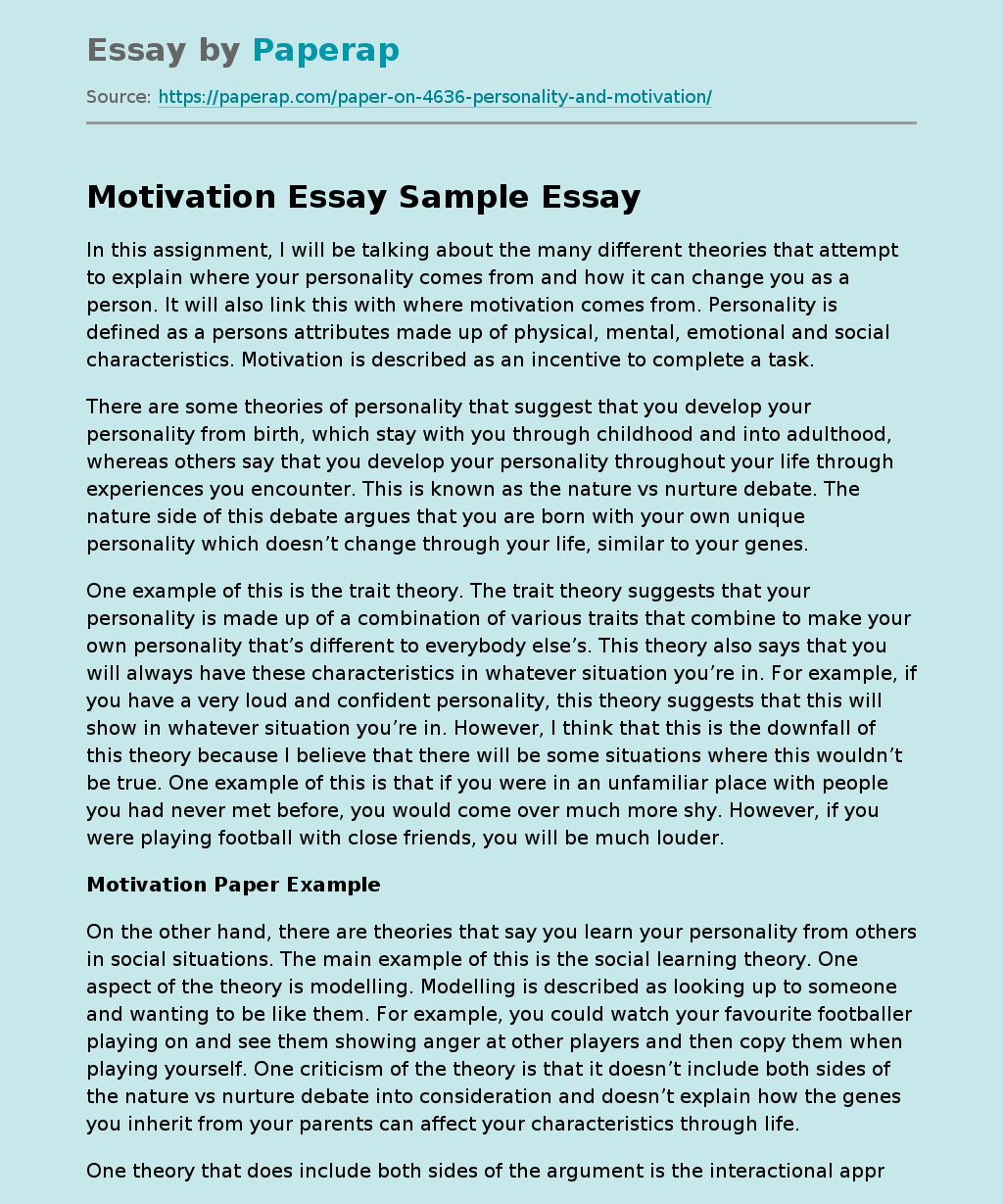Motivation Essay Sample
In this assignment, I will be talking about the many different theories that attempt to explain where your personality comes from and how it can change you as a person. It will also link this with where motivation comes from. Personality is defined as a persons attributes made up of physical, mental, emotional and social characteristics. Motivation is described as an incentive to complete a task.
There are some theories of personality that suggest that you develop your personality from birth, which stay with you through childhood and into adulthood, whereas others say that you develop your personality throughout your life through experiences you encounter.
This is known as the nature vs nurture debate. The nature side of this debate argues that you are born with your own unique personality which doesn’t change through your life, similar to your genes.
One example of this is the trait theory. The trait theory suggests that your personality is made up of a combination of various traits that combine to make your own personality that’s different to everybody else’s.
This theory also says that you will always have these characteristics in whatever situation you’re in. For example, if you have a very loud and confident personality, this theory suggests that this will show in whatever situation you’re in. However, I think that this is the downfall of this theory because I believe that there will be some situations where this wouldn’t be true. One example of this is that if you were in an unfamiliar place with people you had never met before, you would come over much more shy.
However, if you were playing football with close friends, you will be much louder.
Motivation Paper Example
On the other hand, there are theories that say you learn your personality from others in social situations. The main example of this is the social learning theory. One aspect of the theory is modelling. Modelling is described as looking up to someone and wanting to be like them. For example, you could watch your favourite footballer playing on and see them showing anger at other players and then copy them when playing yourself. One criticism of the theory is that it doesn’t include both sides of the nature vs nurture debate into consideration and doesn’t explain how the genes you inherit from your parents can affect your characteristics through life.
One theory that does include both sides of the argument is the interactional approach theory, otherwise known as the trait-state approach. This is one of the few theories that takes both sides of the nature vs nurture debate into consideration. This theory is much more advanced than the trait theory and the social learning theory because it doesn’t just concentrate on one particular reason, but instead takes more possibilities into consideration. The trait side of the theory covers the characteristics you are born with and take with you throughout your life. However, these characteristics can change depending on the situation you are in.
This is the state side of the theory. It says neither traits nor situations can predict behaviour alone. For example, if someone is playing for a team, they will follow orders and do what they are told by the captain. But when they are made captain themselves their natural trait of being very commanding may show through much more. However there is one area that it doesn’t cover and that is the aspect of free will, unlike the Matt Jarvis theory. Free will takes into consideration that people make impulse decisions when forced to make a quick choice.
There are also three other parts to the Matt Jarvis theory. The four main points are past experiences, genetics, situation and free will. This theory covers all areas and doesn’t just say that you get your personality from one place, but in fact a combination of factors. Past experiences effect how you act. For example if you have broken your leg playing football before, you are more likely to pull out of a tackle. The situation part of the theory takes how people behave in different places into consideration. Free will covers for the impulse decisions made on the spot and genetics explains how genes can affect personality, similar to Sheldon’s constitutional theory. However this is the most thorough theory and the one that I believe is the most accurate. There are so many influences on your personality that it is impossible to come up with a theory to cover every possibility. But this theory does cover most with the four parts.
Looking at all theories I believe that it is impossible to predict where you get your personality from because there are so many life changing experiences that you live through and situations to affect how you act. Sport is definitely a good example of how personalities can change so easily. You could be playing football and act completely different depending on a number of factors, including where you’re playing, who you’re playing with, your role in the team and many more. Personality is closely linked with motivation. There are many reasons why people play sport. These reasons can be split into two specific areas which are intrinsic motivation and extrinsic motivation.
Motivation Essay Sample. (2019, Dec 05). Retrieved from https://paperap.com/paper-on-4636-personality-and-motivation/

